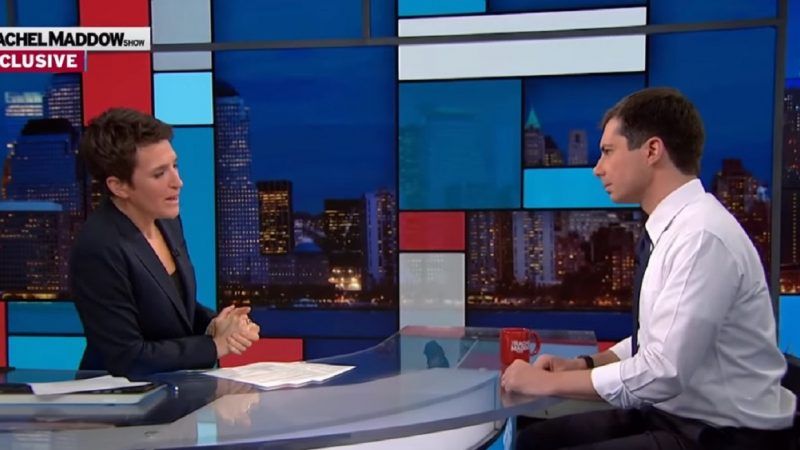Pete Buttigieg's National Service Plan Is a Really Bad Idea Whose Time Might Have Come
Mayor Pete pitches a vague policy as a cure to help fix "the lack of social cohesion" that he says defines contemporary America.

Democratic presidential candidate Pete Buttigieg told Rachel Maddow recently that "national service will become one of the themes of [my] 2020 campaign." As the MSNBC clip below makes clear, the defining element of the plan put forward by the Afghanistan War veteran and mayor of South Bend, Indiana, is its vagueness. In fact, it's not even clear if Buttigieg would make a year's worth of service for high school grads mandatory or not. At one point he says he hopes to "make it, if not legally obligatory, then a social norm," which can be read both as wanting to make it mandatory or simply a cultural expectation. There's no mention of a national service plan in his book, Shortest Way Home, and there's no mention of it on his campaign website either (in fact, I couldn't find a list of any positions or policies on his website, suggesting that the Los Angeles Times' Doyle McManus is right when he claims that the candidate "has everything except positions on major issues").
Buttigieg invoked the World War II service of John F. Kennedy and George H.W. Bush and his own military service as positive examples of privileged people mixing with people they otherwise would never get to know (he implies that JFK served with African Americans, but the military was segregated during World War II). That sort of service across class, geographical, and racial lines, he argues, is good for America, especially considering the "lack of social cohesion" he says characterizes not just Donald Trump's presidency but our larger "era." Rachel Maddow piped up that she has long "struggled with the civilian-military divide" and "the easy answer is there should be a draft," even as she acknowledged that the Pentagon is firmly against conscription, believing it undermines morale and would pull in unqualified people.
The libertarian argument against military conscription was best summarized by Milton Friedman, who served on the federal commission that helped end the draft in the early 1970s. After listening to Gen. William Westmoreland, the U.S. commander in Vietnam, inveigh against an all-volunteer army as mere "mercenaries," Friedman replied, "General, would you rather command an army of slaves?" The same logic applies to mandatory non-military national service.
Buttigieg was emphatic that he's not talking about forcing people to serve only in the military. Again, there were no details, but his national service plan would include having 18-year-old kids sign up for the armed forces or for a wide variety of other public-sector jobs. National service, he avers, is "one of those ideas that's always popular but never urgent." That's true, regardless of political persuasion. Democrats such as former New Jersey Sen. Bill Bradley was also yammering on about it and the conservative Republican William F. Buckley, Jr. wrote a 1990 book, Gratitude, touting the idea.
Beyond being deeply illiberal, mandatory national service is profoundly at odds with the American experience. Unlike most European countries, for most of our history, we didn't have conscription unless there was an active war. It's true that during World War II, when essentially all aspects of the economy were put in service to the war effort, the draft took in a wide swath of men from all classes. But even then, well-connected folks got out of serving altogether or landed relatively safe military jobs (ask Lyndon Johnson and Richard Nixon, whose desk-jockey assignments were seen as impediments to their post-war political careers).
More important, citing elements of the total mobilization of American society to fight World War II in order to sell peacetime policy proposals is a category error. Regardless of the lack of "social cohesion," we should not be looking for guidance now to a period when food, gas, and more were rationed and the government effectively controlled the economy and virtually all aspects of life. During the Civil War, wealthy northern conscripts could buy their way out of serving and in smaller-scale call-ups (Korean, Vietnam, the Cold War years), connected people always found a way around serving. There's every reason to believe the same sort of issues would plague any sort of national service plan.
In talking with Maddow, Mayor Pete granted that any sort of program would also cost a lot of money, which, along with the sheer vagueness of his plan, works against its odds of becoming a reality. Yet this may be a bad idea whose time is coming, especially as Millennials such as Buttigieg ascend into positions of power.
The Green New Deal championed by fellow Millennial Alexandria Ocasio-Cortez includes a plan for the government to guarantee everyone a job, which is sort of the kissing cousin of national service and underscores younger Americans' anxiety about finding employment. And a 2017 poll of 18-to-29-year-olds by Harvard's Institute of Politics found 50 percent supporting voluntary national service (the good news: Just 7 percent support mandatory service).
Indeed, if politics teaches us anything, it's that bad ideas become laws all the time.
